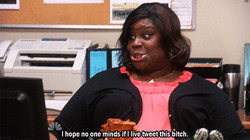|
This is on my experience with balancing efforts to increase diversity in a homogeneous academic field and doing the science research I love. If you have thoughts, please share in the comments.
For the last few weeks, I’ve been shelving my hobbies (writing, painting, making stuff out of other stuff) in lieu of a new task, one that isn’t at all a hobby, but is definitely not part of my job. My job as a graduate student is to absorb knowledge and skills from as many places as I can, to translate what I’ve garnered into some new knowledge, and to put that knowledge into the world as published research. (For context, I also buy and sample international variations on the cheese puff and I watch what my mother would call 'television that does not edify the mind', so it’s not all fun and games.) I do research because I love it and I think it makes me better. I do research because I like to think it might make the world better.
14 Comments
“There was an enormous body of masculine opinion to the effect that nothing could be expected of women intellectually. Even if her father did not read out loud these opinions, any girl could read them for herself; and the reading, even in the nineteenth century, must have lowered her vitality, and told profoundly upon her work. There would always have been that assertion—you cannot do this, you are incapable of doing that—to protest against, to overcome.” This is the epigraph of a paper in the Journal of Experimental Social Psychology titled “Stereotype Threat and Women’s Math Performance” (Spencer et al. 1999). I’ve got to start by saying that this is an amazing quotation to open a paper. Woolf published A Room of One’s Own in 1929, when the borders surrounding the acts of being and doing were explicit and codified for women. Decades later, in 1999, Woolf’s lamentation remained relevant and remains relevant in 2016. Part of Spencer’s doctoral dissertation was this study on the effect of stereotype threat, which the authors define as “the experience of being in a situation where one faces judgment based on societal stereotypes about one’s group”, on how individuals deal with situations where their actions may reinforce the existing stereotype. Not only was this research unique at the time for exploring the experience of being judged or stereotyped, but it also started by focusing on a societally common but rarely critically examined stereotype—that females perform poorly in math compared to males. Spencer hypothesized, correctly, that when you know someone is judging you, that the expectations set for you are low or negative, that knowledge interferes with how well you can do, even if you are capable of performing well.
 My life, both as a Graduate Student and as A Human in The World, has been sort of chaotic of late, leading me to avoid trying to sit down and get my thoughts about the things happening to/because of me into an intelligible format. Not just an intelligible format but more importantly, one that matters to anyone besides my personified diary. Diary: It’s been a while Sue, girl. Tell it how it is! Let it all out. Don’t even worry about how it will all sound. This is a safe space for your tender grad student underbelly. Sue: Diary, thank you so much for saying that. You’re always so available and I love that I can imagine you as Donna from Parks and Rec and not feel like I’m perpetuating stereotypes in this safe space. Diary: Whatever, girl, I will be as sassy and supportive as you need me to be. All you have to do is write some sentences in me, at some point. Just a few. Sue: (Fidgeting with a melting tub of ice cream) I’m really sorry I’m so busy right now I can’t write about my life but thanks again for reminding me, you’re literally the greatest. *Sheepishly opens Netflix* Diary: -_____- Scandal, really? Basic. |
IntentTo document interesting ideas about science and nature and reflect on the experience of being a scientist from the margins. Archives
March 2021
Categories
All
|
 RSS Feed
RSS Feed
